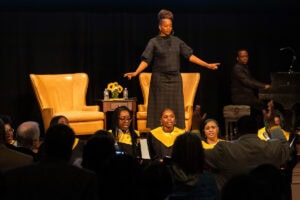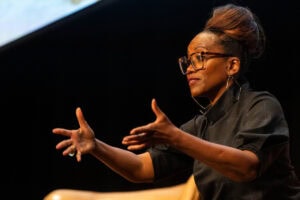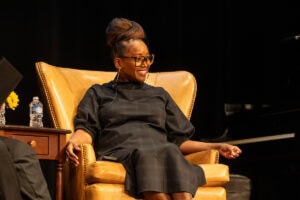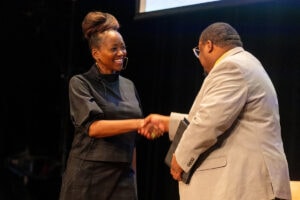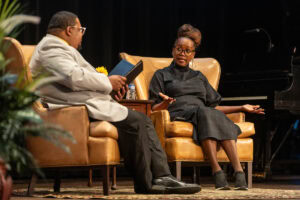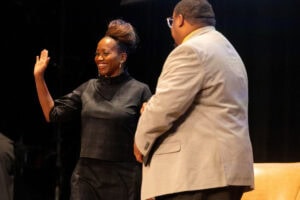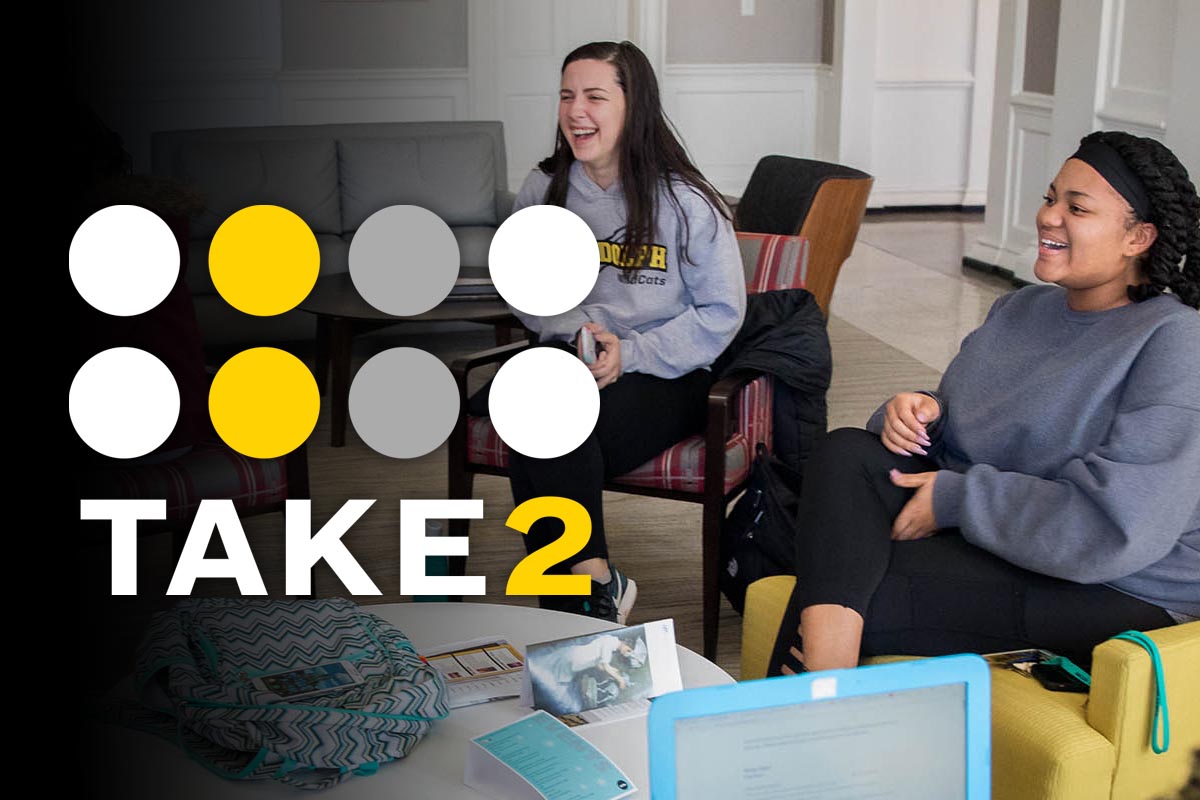Pushing Boundaries: Erika Alexander shares passion for creativity and advocacy
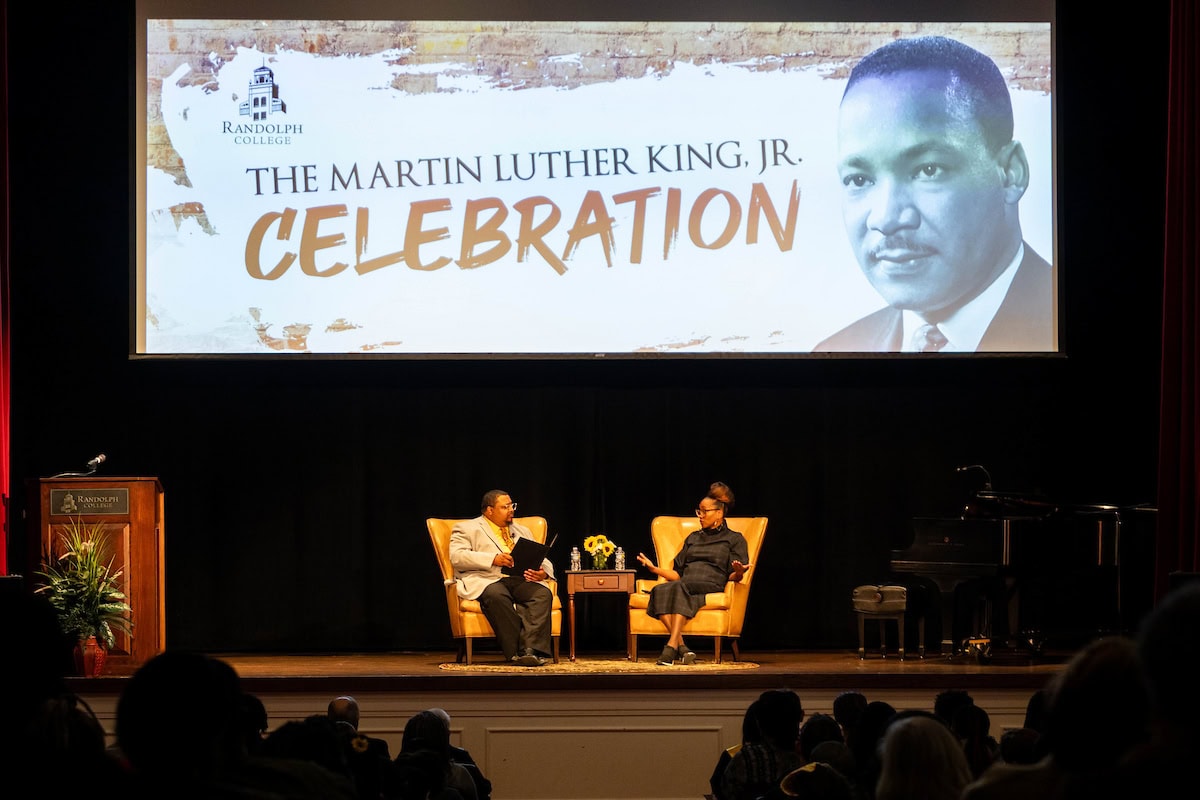
Chief Diversity Officer Charles Gibson III and actress Erika Alexander talk onstage during the January MLK Celebration.
When Erika Alexander took on the role of Maxine Shaw in the 1990s sitcom, Living Single, she didn’t fully understand who Maxine was. But she found her over five seasons, shaping a character whose sharp wit, signature style, and swagger left a lasting mark.
“Maxine Shaw, I think, was planted like a seed in many, especially women and women of color’s minds and bodies, as an avatar of their future self,” Alexander said during Randolph’s annual Martin Luther King Jr. Celebration in January. “They loved her attitude of strength and confidence.”
Now, more than 30 years later, Maxine remains a cultural icon who women like Congresswoman Ayanna Pressley and former Georgia state representative Stacey Abrams have cited as influences.
There’s even an entire website, The Maxine Shaw Effect, dedicated to the character, whose “image, personality and ambition redefined what young Black women could expect of themselves and demand of the world.”
“It says something about the power of representation,” Alexander said in an interview ahead of the MLK event.
“Obviously, these women had leadership positions in their DNA and were going to push forward as lawyers, executives, judges, teachers,” she added. “But I think everybody needs inspiration for their aspirations. That’s what Maxine Shaw is. She’s a lived, fictional experience that somehow anchors in a real person’s mind and tells them that their course, or their goal, is possible.”
Close to 500 people attended the College’s event, where Lynchburg City Councilman Sterling Wilder introduced Alexander.
“Through her groundbreaking work on the screen and her passionate advocacy for social justice, she has shown us what it means to use our art and influence for greater purpose,” he said.
In an onstage conversation with Chief Engagement and Belonging Officer Charles E. Gibson III, Alexander discussed her career—from being discovered at age 14 to creating her own opportunities.
“You get a part, and you might do it for three months or three years,” Alexander said. “You’re often asked to have several different lives. Inside of that, I didn’t want to just be a tool in someone else’s box, which is what I am as an actor. I wanted to be a toolmaker. So I had to learn different skill sets and expand my perspective of what I can be.
“Women, certainly many women of color, learn all sorts of skills,” she added, “just so they can do the one thing they want to do.”
Alexander began writing, producing, and directing and even created a comic book series, Concrete Park.
In 2017, she co-founded Color Farm Media, which works to bring greater representation to both media and politics.
Her directorial debut, The Big Payback, premiered at the 2022 Tribeca Film Festival and aired on PBS on MLK Day last year. The documentary chronicles the story of the first reparations bill for African Americans in U.S. history.
Alexander is also the creator/writer/producer of Finding Tamika, Audible Original’s 2022 Best True Crime Series and a DuPont Columbia award nominee, and producer of John Lewis: Good Trouble, a three-time Emmy nominee and winner of the NAACP Best Documentary.
Currently working on a documentary about the late actress Diahann Carroll, Alexander remains devoted to making a difference offscreen.
She serves as a board member for One Fair Wage and is involved with social and racial justice organizations including The Poor People’s Campaign, Color of Change, the NAACP, and UNCF, among others.
“You can’t live in this world without seeing that there are mechanisms and industries and legislation that can help or hurt you,” she said. “As a community, the beloved community that we are trying to build, if you’re interested in really being a citizen, you have to start to engage. I started to do that as an activist.”
Alexander sees activism and creativity as deeply connected—both offering ways to engage with the world and shape its future.
“I’m glad I’m a storyteller,” she said. “We need new worlds and new authors and new points of views and new discoveries and strategies. That’s what I’m asked to do, to speak to that—the future. We have to push beyond the boundaries to tell a greater, better story.”
This story appears in the Spring 2025 issue of the College’s Magazine, “Vita Abundantior.”
Tags: MLK Celebration, vita spring 2025

